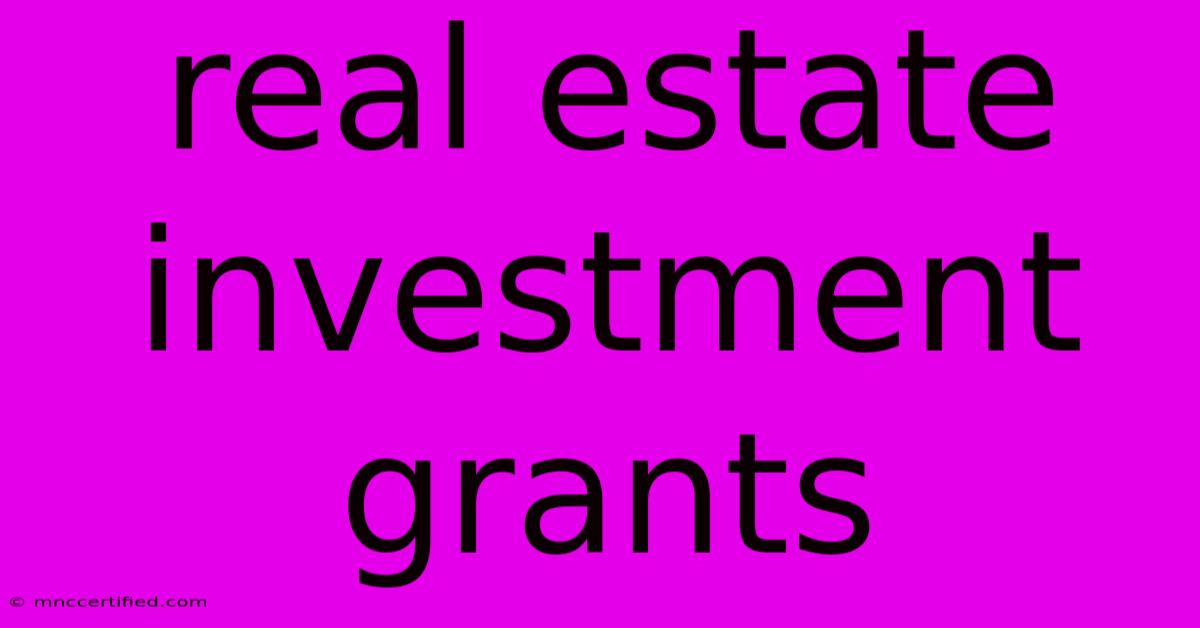Real Estate Investment Grants

Table of Contents
Real Estate Investment Grants: Funding Your Property Dreams
Are you dreaming of building a real estate empire but worried about the hefty upfront costs? Securing funding can be a major hurdle, but did you know that several avenues exist to help you achieve your goals? This comprehensive guide explores the world of real estate investment grants, providing you with the knowledge and resources to find the perfect fit for your project. We'll cover eligibility criteria, application processes, and common pitfalls to avoid.
What are Real Estate Investment Grants?
Unlike loans, real estate investment grants are forms of financial assistance that don't need to be repaid. They're often awarded by government agencies, non-profit organizations, or private foundations to support specific initiatives, such as affordable housing development, community revitalization, or sustainable building practices. These grants can cover a wide range of expenses, including land acquisition, construction costs, rehabilitation, and even down payments.
Types of Real Estate Investment Grants:
The availability of grants varies widely depending on location and the type of project. Some common categories include:
-
Community Development Block Grants (CDBG): These federal grants are allocated to local governments to address community development needs, often including housing initiatives. They frequently fund projects aimed at improving housing conditions for low-to-moderate-income families.
-
Housing and Urban Development (HUD) Grants: The U.S. Department of Housing and Urban Development offers various grant programs focused on affordable housing, homelessness prevention, and community development. These can range from small grants for individual homeowners to large-scale projects for developers.
-
State and Local Grants: Many states and local municipalities offer their own grant programs tailored to specific regional needs. These can focus on things like historic preservation, energy efficiency improvements, or economic development through real estate projects.
-
Private Foundation Grants: Several private foundations provide grants for real estate projects that align with their philanthropic goals. These grants often focus on specific causes, such as environmental sustainability or supporting underserved communities.
Finding the Right Real Estate Investment Grant:
The search for the ideal grant can feel overwhelming, but a structured approach will greatly increase your chances of success.
1. Identify Your Project's Needs:
Before you start searching, clearly define your project. What type of real estate are you investing in? What are your primary goals? Understanding these aspects will help you narrow your search to grants that align with your project's objectives. Keyword research is crucial here. Search for grants using terms specific to your project type (e.g., "grants for affordable multifamily housing," "grants for historic building renovation," "grants for sustainable commercial real estate").
2. Conduct Thorough Research:
Utilize online resources like Grants.gov (for federal grants in the US), websites of relevant government agencies (HUD, USDA), and databases of private foundations. Remember to check for grant deadlines and eligibility criteria carefully.
3. Understand Eligibility Requirements:
Each grant program has specific eligibility criteria. These often include requirements relating to the type of project, location, applicant's qualifications, and the target beneficiaries. Failing to meet these requirements will result in an immediate rejection. Thoroughly review the guidelines for each grant you're considering.
4. Craft a Compelling Grant Proposal:
A well-written grant proposal is crucial for success. It should clearly articulate your project's goals, budget, timeline, and impact. Showcase your understanding of the grant's priorities and highlight your project's alignment with them. Strong narrative and compelling visuals are key to standing out.
5. Network and Build Relationships:
Connecting with organizations and individuals in the real estate and grant-seeking communities can provide valuable insights and networking opportunities. Attend relevant conferences and workshops to learn more about available grants and best practices.
Common Pitfalls to Avoid:
- Ignoring deadlines: Miss a deadline, and your application is automatically disqualified.
- Failing to meet eligibility requirements: Carefully review all criteria before applying.
- Submitting a poorly written proposal: A weak proposal won't impress reviewers.
- Not budgeting accurately: An unrealistic budget will raise red flags.
- Lack of follow-up: After submitting your application, follow up with the grantor to check on the status.
Conclusion:
Securing real estate investment grants can be a game-changer, transforming your investment journey. By following these steps and understanding the nuances of grant seeking, you can significantly increase your chances of success and pave the way for your real estate investment dreams. Remember, thorough research, a well-crafted proposal, and consistent effort are key ingredients in securing funding for your projects. Good luck!

Thank you for visiting our website wich cover about Real Estate Investment Grants. We hope the information provided has been useful to you. Feel free to contact us if you have any questions or need further assistance. See you next time and dont miss to bookmark.
Featured Posts
-
Is Metroplus A Good Insurance
Nov 29, 2024
-
Sprouse Insurance Vernal Utah
Nov 29, 2024
-
Best Black Friday Apple Watch Deals
Nov 29, 2024
-
Typhoo Tea In Administration After 121 Years
Nov 29, 2024
-
Matchday Clements Starting Xi
Nov 29, 2024